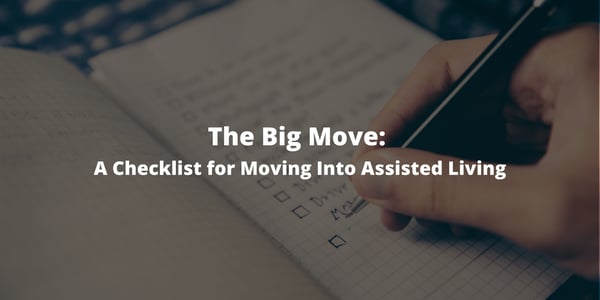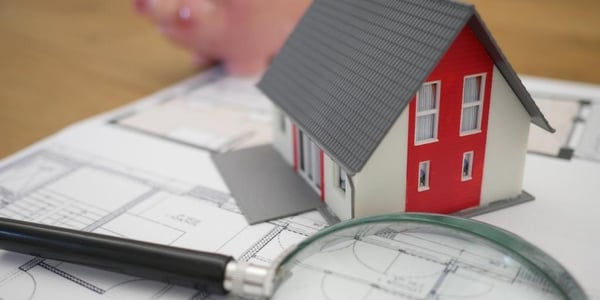7 Tips for Moving Day: Moving Into a Senior Living Community
Finally, it's the big day. It's time to move into your senior living community. Moving is often a stressful event, but with a little bit of planning ahead and a positive attitude, you can transform your moving day from a major pickle to a piece of cake. Having a good moving day sets a positive tone and makes the move much less stressful. Here are the best tips for optimizing your moving day!
Tips for a Successful Moving Day
-
Plan Ahead
Planning ahead makes any experience smoother. Anticipating needs and making plans to meet them helps avoid trouble. And when trouble pops up unexpectedly, proper planning will help you endure even the roughest set of unplanned circumstances.
As part of your plan, keep your essentials close at hand. Essential items are things you need to get through the day. They're things that you can't afford to lose track of in the shuffle of moving day. This includes:
-
Cash, credit cards, and other means of exchange;
-
Prescription medications;
-
Glasses, hearing aids, dentures
-
Important documents, such as your ID, medical records, and insurance documents.
It's also a good idea to pack a small set of basic living supplies that can last you three to five days. Pack items like clothes, books, personal hygiene supplies, and important electronics like your laptop or tablet. Keeping your essentials and a few days of living items close at hand will ensure that you have easy access to what you need to be comfortable while you settle in to your new environment.
-
-
Make A Checklist
Airline pilots and surgeons use checklists all the time, and for a good reason. A checklist is an excellent way to manage a complex task and ensure nothing is missed. Before you move, make a checklist of things that need to be done before, during, and after moving day. Think about how long those tasks take and what they require. Do you need specific papers or documents? Many moving-related tasks can now be done online; for example, changing one's address can be done on the Postal Service's website!
-
Plan For Your Space
Moving into a senior living community sometimes means downsizing. You might be moving from a four-bedroom house to a two-bedroom townhome, a flat, or a home with a smaller footprint. It's important that you consider your new space when planning your move. For example, your eight-cushion sectional couch might have been a staple item in your previous home, but your new place might not have the footprint for such a massive piece of furniture! Making a realistic plan for your new space will help make moving day much less stressful.
-
Use the Move to Declutter
Part of planning for your space is decluttering. As you're packing, think about what you really want and need. Sorting through your things and streamlining them in a thoughtful way can improve your sense of well-being and make the transition to your new home smoother and more relaxing. For example, do you really need seven old baking sheets or that box of random cables? If you're retired, do you need a closet full of business attire? Planning for your new space is a great opportunity to do some serious tidying up and make more space for the things you really care about.
-
Ask for Help
It can be hard to ask for help. Asking for help feels like an admission that you can't do something. But that is not a bad thing! Asking for help is an intelligent way to maximize your available resources to make your moving day go smoothly. It is okay to ask your kids, grandkids, or other family to help you sort and pack. There are ways to ask gracefully, and as long as you keep your expectations realistic, your family will certainly be glad to help out.
If you're still not comfortable asking for help, consider paying for help. Moving companies specialize in helping people move, so they're a great resource for help! Moving can be physically strenuous and exhausting; it is okay to pay someone else to do it for you. You can drink a smoothie and relax while the pros handle your boxes and furnishings.
-
Manage Your Needs
One of the best ways to make moving day a breeze is to plan out how to manage your needs. An easy place to begin is by planning your meals. Remember that you have a different set of resources available when you're moving, so it's probably not a good idea to plan to make your seven-ingredient omelet on moving day. Cooking is a complex task that requires a lot of items to be unpacked, so you'll likely want to eat out for most of your moving day. It's not a bad idea to pack healthy snacks like trail mix, fruit, nuts, or even cheese sticks. You should also plan to stay hydrated: a cooler of bottled water is a great resource on moving day.
You should also dress comfortably. You'll probably be moving around a fair amount, so you'll want to have clothes that won't feel restrictive or confining. If it's cold, dress appropriately and consider bringing some blankets. If it's hot, find shade and drink plenty of water.
Finally, take breaks when you need them. It's one thing to move when you're 21, and it's another to move when you're heading into your golden years. Don't overexert yourself! It is okay to take a break. You can even take mental health breaks if moving day is getting stressful; it's okay to take five and dip out to Starbucks or Dunkin to catch your breath and recharge.
-
Decompress
No matter how much you plan, moving day may still be stressful. Plan some time to decompress after the move. This could be a good opportunity to go out to dinner, have a pizza party, or even go out for a family activity like mini-golf or bowling. Moving day can be hectic and challenging, but with a bit of planning, you can make it into a positive and easy experience.
Learn more about preparing to move on our Housing Resources and Long-term Care Resources pages!






